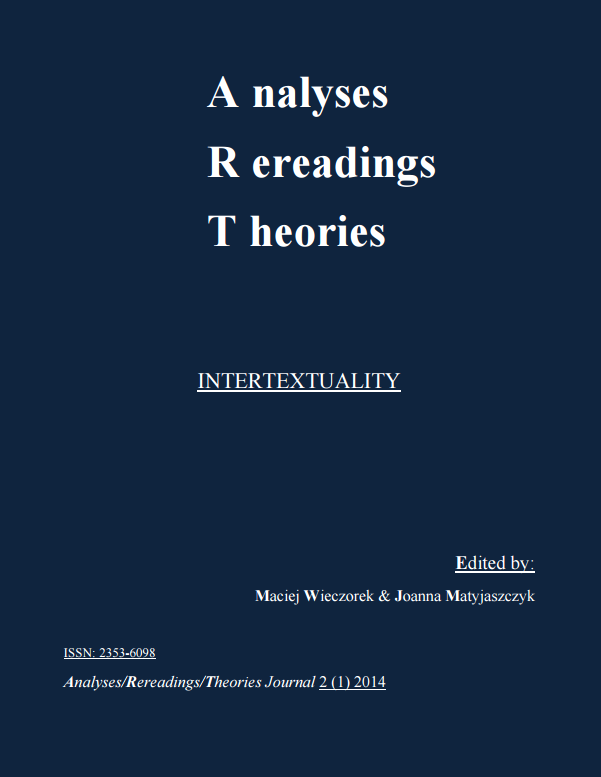Retelling Orpheus: Orpheus in the Renaissance
DOI:
https://doi.org/10.18778/2353-6098.2.01Keywords:
Orpheus, Metamorphoses, RenaissanceAbstract
This paper examines the importance of the Orpheus myth during the English Renaissance. The Orpheus myth was one of the most common mythic intertexts of the period due to the fact that we could see the very story of Orpheus as being imbedded within the idea of the Renaissance itself. The main ambition of the Renaissance humanist was to bring the literature of the ancients back to life via the means of education. In other words, they attempted to bring the dead back to life and Orpheus serves as an embodiment of this ambition due to his ability to bring inanimate objects to life and in his journey to the underworld to rescue Eurydice. We find many different aspects of the Orpheus myth dealt with in Renaissance writing, for example Orpheus as poet, Orpheus as lover and the death of Orpheus being some of the key focal points. This paper, however, will focus specifically on the role of Orpheus as Poet as, due to the Renaissance love for art, rhetoric and eloquence, this seems to be the most popular dimension of the Orpheus myth at that time. We will see how Renaissance writers reinterpret the story of Orpheus, as originally told by Ovid and Virgil, in the “Metamorphoses” and the “Georgics” respectively, to show Orpheus as not only as being an archetypal poet but in fact the very first poet whose art is not only responsible for the civilisation of man, but also for the creation of a “Golden Age” in Renaissance England.
References
Apollonius, Rhodius. The Argonautica. Trans. R.C. Seaton. Cambridge, Mass.: Harvard UP, 1955. Print.
Google Scholar
Bacon, Francis. The Wisdom of the Ancients. Printed for H. Herringman, R. Scot, R. Chiswell, A. Swalle, and R. Bentley, 1696. Early English Books Online. Web. 20 Oct. 2011.
Google Scholar
Campion, Thomas. A Relation of the Late Royal Entertainment. Printed by William Stansby for John Budge, 1613. Early English Books Online. Web. 20 Oct. 2011.
Google Scholar
DeNeef, A. L. “The Poetics of Orpheus: The Text and a Study of Orpheus and His Journey to Hell.” Studies in Philology 89.1 (1992): 20-70. Print.
Google Scholar
Fletcher, Phineas. The Purple Island, or the Isle of Man. Printed by the Printers to the U of Cambridge, 1633. Early English Books Online. Web. 20 Oct 2011.
Google Scholar
Gifford, Henry. A Poesie of Gilloflowers. Printed by Thomas Dawson for John Perin, 1580. Early English Books Online. Web. 20 Oct 2011.
Google Scholar
Gros Louis, Kenneth. “The Triumph and Death of Orpheus in the English Renaissance.” Studies in English Literature, 1500-1900 9.1 (1969): 63-80. Print.
Google Scholar
DOI: https://doi.org/10.2307/449934
Hesiod. Theogony, Works and Days, Testimonia. Ed. G. Most. London: Harvard UP, 2006. Print.
Google Scholar
DOI: https://doi.org/10.3998/mpub.162385
Horace. Satires, Epistles and Ars Poetica. Ed. H. Fairclough. London: Harvard UP, 1978.
Google Scholar
Kempe, William. The Education of Children in Learning. Printed by Thomas Orwin for Iohn Porter and Thomas Gubbin, 1588. Early English Books Online. Web. 20 Oct. 2011.
Google Scholar
Leroy, Louis. On the Interchangeable Course, or the Variety of Things in the Whole World. Printed by Charles Yetsweirt Esq., 1594. Early English Books Online. Web. 20 Oct 2011.
Google Scholar
Lodge, Thomas. A Defence of Poetry, Music and Stage Plays. London: Shakespeare Society, 1853. Print.
Google Scholar
Martindale, Charles, and Michelle Martindale. Shakespeare and the Uses of Antiquity: An Introductory Essay. London: Routledge, 1994. Print.
Google Scholar
Miles, Geoffrey. Classical Mythology in English Literature: A Critical Anthology. London: Routledge, 1999. Print.
Google Scholar
A Most Pleasant Comedie of Mucedorus the Kings Sonne of Valentia and Amadine the Kings Daughter of Arragon. Printed for William Iones, dwelling at Holborne conduit, at the signe of the Gunne, 1598. Early English Books Online. Web. 20 Oct 2011.
Google Scholar
“Natural Philosophy.” The Oxford English Dictionary. 3rd Edition. 2003. Web. 17 Dec. 2011.
Google Scholar
DOI: https://doi.org/10.1108/09504120310490985
“Orpheus.” The Spenser Encyclopedia. 1990. Print.
Google Scholar
Ovid. Metamorphoses. The Latin Library, n.d. Web. 8 Nov. 2011.
Google Scholar
Plett, Heinreich. F. Rhetoric and Renaissance Culture. Berlin: De Gruyter, 2004. Print.
Google Scholar
DOI: https://doi.org/10.1515/9783110201895
Puttenham, George. The Art of English Poesy. Ed. R. Puttenham et. al. New York: Cornell UP, 2007. Print.
Google Scholar
Rhodes, Neil. The Power of Eloquence and English Renaissance Literature. New York: St. Martin’s P, 1992. Print.
Google Scholar
Root, Robert K. Classical Mythology in Shakespeare. New York: H. Holt and Company, 1903. Print.
Google Scholar
Sandys, George. Ovid’s Metamorphoses Englished, Oxford 1632. Oxford: Garland Pub., 1976. Print.
Google Scholar
Shakespeare, William. The Merchant of Venice. Ed. M. Mahood. Cambridge: Cambridge UP, 2003. Print.
Google Scholar
Shakespeare, William. The Two Gentlemen of Verona. Ed. K. Schlueter. Cambridge: Cambridge UP, 1990. Print.
Google Scholar
The Two Gentlemen of Verona. Ed. K. Schlueter. Cambridge: Cambridge UP, 1990. Print.
Google Scholar
Spenser, Edmund. The Faerie Queene. Printed by Richard Field for William Ponsonbie, 1596. Early English Books Online. Web. 20.Oct. 2011.
Google Scholar
Warden, John. Orpheus, the Metamorphoses of a Myth. Toronto: U of Toronto P, 1982. Print.
Google Scholar
DOI: https://doi.org/10.3138/9781487579807
Webbe, William. A Discourse of English Poetrie. Printed by Iohn Charlewood for Robert Walley, 1586. Early English Books Online. Web. 20 Oct 2011.
Google Scholar
Vaughan, William. The Golden Grove. Printed by Simon Stafford, 1600. Walley, 1586. Early English Books Online. Web. 20 Oct 2011.
Google Scholar
Virgil. Virgil: Georgics. Ed. R. Thomas, P. Easterling, and P. Hardie. Vol. 2. Cambridge: Cambridge UP, 1988. Print.
Google Scholar
Downloads
Published
How to Cite
Issue
Section
License

This work is licensed under a Creative Commons Attribution-NonCommercial-NoDerivatives 3.0 Unported License.









